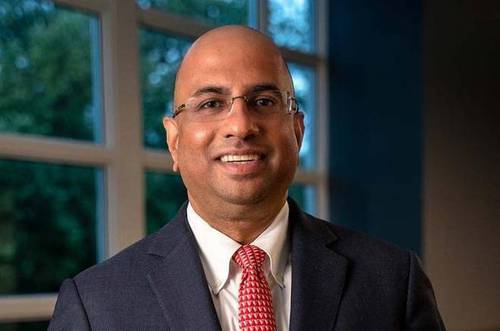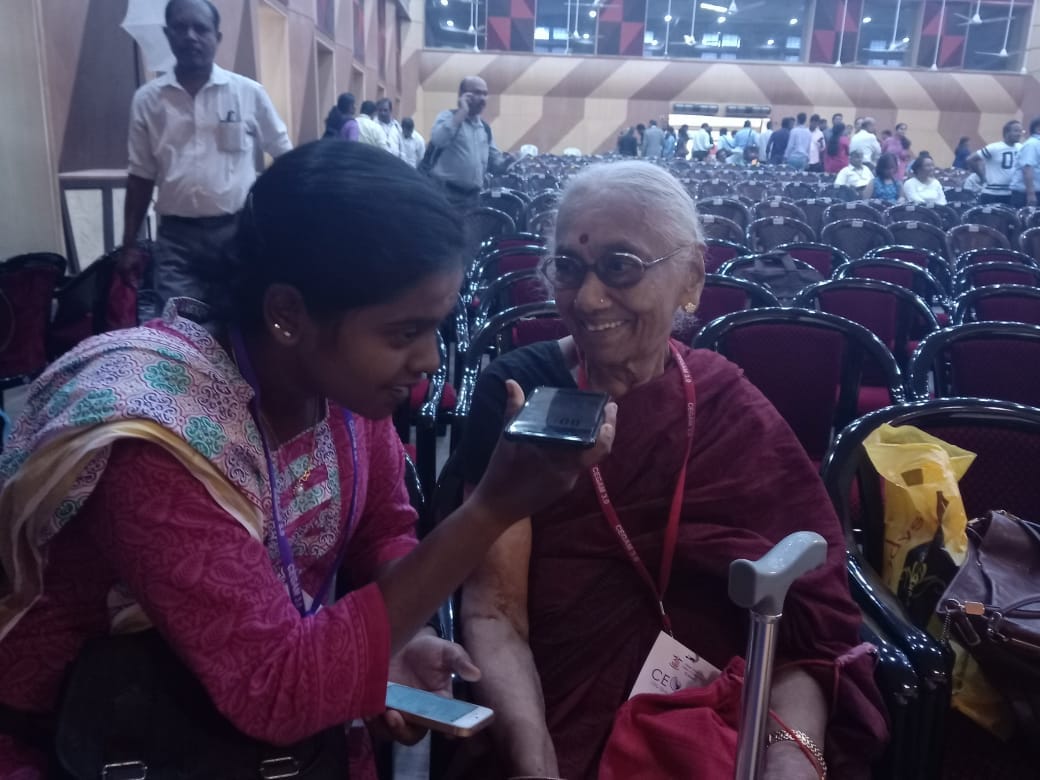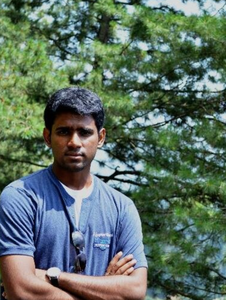When someone who has aced the Civil Services examination right in his first attempt turns up to visit his college, it becomes a celebration. Particularly for a person who has secured an All-India Rank of 72 to be proudly inducted into the Indian Administrative Service, it was a great feeling to be back to his old, golden days.
The Civil Services Talk, an interactive session organized by the Hobbeee Club of the Department of Electrical and Electronics Engineering, on 11th August (Thursday) at the Hall of Guines, witnessed the story of how Mr. Sibi Adhithya Senthil Kumar (EEE, batch of 2014) managed to achieve the remarkable feat.
The Welcome Address delivered by Dr P. Vanaja Ranjan, Professor, EEE department, was filled with reminiscences about Mr. Sibi Adhithya's days as a college student. She also analogised the long term goals of an administrative officer to the long distance focus lights developed by Ford Motors, in order to overcome the visibility problems. "The focal lights were developed for better visibility, and similarly our vision must be vast, covering long term goals", she stated.

Dr. Uma Mageshwari, Professor, EEE, also recollected fondly the college days of Mr. Sibi, and reiterated that people and their mentalities remain stagnant though leaders change periodically. "It's in the hands of these officers like Sibi to change the pessimistic mindset of the masses, who keep expecting a change but do not work towards it", she asseverated.

The highlight of the day was when Mr Sibi occupied the podium to address the gathering. Beginning with a comparison between Sachin Tendulkar and Rahul Dravid, he went on to say, "While Sachin's batting prowess when seen would be more of a natural process, Dravid's technique could be viewed as technically built up after hard work. But hard work is one of the most underrated virtues", adding that cracking UPSC examinations does not require vast amounts of brain power, but only the perseverance and dedication to work towards it.
The guest for the day also elaborated on the fine line between being happy and being satisfied. He opined that he was happy that he had gotten into an elite category of people who serve the country, but would never be satisfied because satisfaction would make him not want to work anymore. "Happiness would push your limits, while satisfaction would bog you down", he explained.
While stressing on the importance of training and continuous practice, especially for an arduous exam like the UPSC, he briefed about how the United States of America prepared its soldiers during World War II with rigorous training. He reasoned, "Under pressure situations, one's performance would crumble up to the level of training. So if the training itself is made full-fledged, there will be no problems during the actual battle."
He also advised the students to concentrate on their engineering, not just for the academic benefits that accompany them, but also because every human being should have the moral responsibility of focusing 100% on whatever he or she does. Stressing on the importance of reading newspapers, he spoke that they are the media that make the isolated individuals get connected with the social ecosystem. "More than knowledge, the awareness you gain is what makes reading newspapers an important habit in the routine", he summed up.

Following this was the interactive session, where Mr. Sibi Adhithya answered the questions posed by the inquisitive aspirants.
Excerpts:
On his training period beginning soon:
“The actual training begins on August 29th at Mussoorie. First, all the officers would have a 100-day foundation course, after which they would b taken on a two-month nationwide tour to gauge the cultural and linguistic differences in the country. After this, only the IAS officers will return to Mussoorie for further training. The two-year long training would also comprise a one-year period at an allotted state to know the administrative role.”
On the examination pattern and schedule:
“Prelims would be MCQ-based with two papers, while the Mains would be of descriptive nature with 9 papers (2 compulsory papers, 4 general studies, 1 essay and 2 electives), which would be conducted back-to-back in 5 days.
Since two exams of descriptive writing would take place in a single day, continuously for 5 days without any gap, physical and mental health is very important. It is not like the assessment exams where you write one paper and bunk classes to sleep in your hostel rooms.
The final round is the interview, where every candidate would be examined by a panel of 5 members.
The prelims is only a filtering round; scores of the mains and the interview would be consolidated for the final rank list, categorising the eligible candidates into the 19 services of the UPSC. The top 1200 rank holders would have the opportunity to become civil servants.”
On the support he had from his family:
“There are two kinds of people generally - those who are aloof towards their family, and those who are affectionate towards their family. In my perspective, since I belong to the second category, a familiar environment with healthy food is an important aspect that influences your preparation and concentration.
In my opinion, people who stay outside to prepare will take some time to acquaint themselves with the new environment. That period would play a crucial role when the overall preparation comes into the picture.”
On authoring the book, CEG - A Journey Through Time:
“It helped me in two ways. Firstly, I was an introvert who kept most things to myself. But working on this book meant I had to contact a lot of people and work with my classmates and college friends. So when I decided to prepare for the Civil Services, I had this positive thought that made me go further and further. "If a mammoth task involving so many people and information could be achieved, what's the big deal in my clearing an exam, where me and my preparations would be the only factors that would decide my fate?"
Secondly, this topic was raised in the interview process, and I am glad that I could explain about the book to them for around 10 minutes.”
On full time versus part time preparation:
“Focus happens only when you are 100% involved in only one task simultaneously. So unless you have the situation of having to work for financial sake, it is always good to prepare single-minded without taking up jobs.
There's a theory called the 10,000 Hours Test. You become the master of any field when you work on it for 10,000 hours. Even if not that much, spending at least 1,000 hours in a subject is necessary.”
On his interview process:
“Interviews basically test your temperamental and rational thinking. The following are some of the aspects the panel would look for in you:
1) How much your degree of confidence is when you try to answer a question after reply "No" or "I don't know" to the previous one.
2) How honest you are in replying "I don't know" to a question.
3) Your logical interpretation and rational reasoning; don't give emotional replies.
4) Engaging with all members of the panel, rather than focusing only one person. This includes the body language and eye contact aspects.
My interview had questions related to the basic concepts of EEE, but they were not purely technical. Questions related to the potential of energy sources in the country were raised. 'What is Power Factor?' was the only definition I was asked to explain.
Interviews focus on your area of study because the interviewers think that they could make you comfortable that way, but then, they end up making you uncomfortable most of the time (laughs).”
On when, why and how he chose this career path:
“There is this concept called 'Maslow's Hierarchy of Needs'. Starting from the basic level of day-to-day needs, the ladder moves on towards security needs, wants and wishes on love and relationships, and then towards luxury. The final stage in this process that forms the apex of the triangle is self actualization.
There was some point during my second year of engineering that I realized this and decided that I would give Civil Services Examinations a shot.”
On how IAS officers are appointed as Directors of Departments and District Collectors:
“Initially, the IAS officers are made District Collectors to have an understanding of all the departments that come under the administration of a district. As they gain experience, they are then elevated to the Directors of several departments in both the State as well as Union governments. There are also possibilities that an IAS officer could represent India as a delegate in World Bank conferences.
On CEG:
“The free time that this campus offered is one thing that I would always miss throughout my life. My being the General Secretary of SEEE and working for the department is an unforgettable experience.”
On his vision:
“I wouldn't say I am going to develop and change the whole of India. But I would like to change the work culture and environment whichever office I would be posted to, after the training. It is not a right thing that the government offices maintain a kind of remoteness with the general public. Basically, accessibility and transparency to the public are two aspects I would like to work on.”
On the perks of being an IAS officer:
“You have a sense of pride and reputation as an IAS, though you are not getting paid as much as, say, an IT company employee. But it is never about the money. Moreover, coming to think of it, you get amenities and other arrangements free of cost, so I guess it gets offset and you can imagine yourself being equally paid to a corporate worker.
The responsibility and fulfillment you have in your work are things that matter, not the monetary gains that come out of it.”
The memorable eventually ended with the Vote of Thanks presented by Ms. Dhebeha, final year EEE, followed by the National Anthem. This was one session that penetrated deep into the minds and hearts of the civil service aspirants, enthusing them to prepare with the fullest enthusiasm and confidence, to serve the country and its citizens.
The Guindy Times applauds its Ex-Vice President Mr. Sibi Adhithya Senthil Kumar for his achievement and wishes him the best of luck in his future endeavors.





